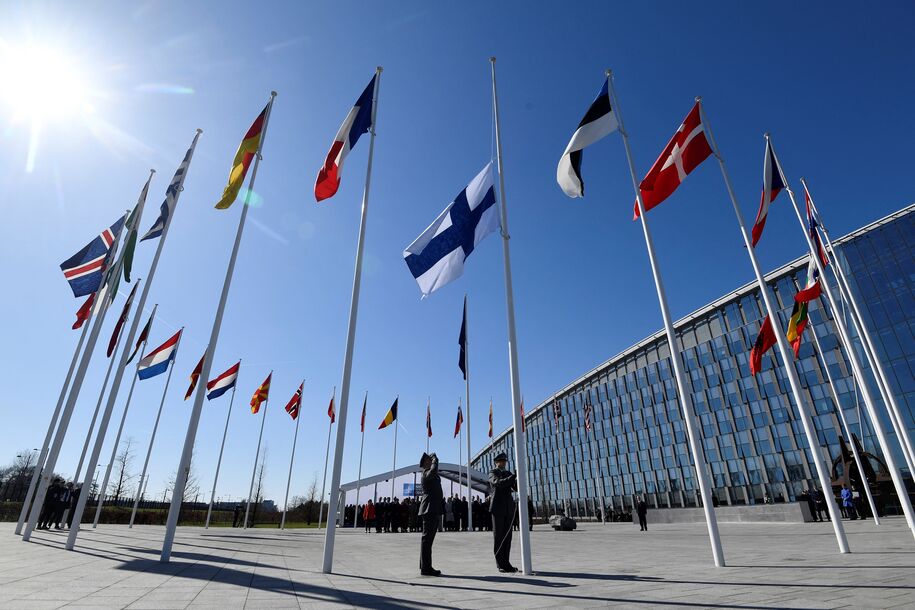European leaders have had mixed reactions to Donald Trump’s comments about NATO during a rally in South Carolina. Germany’s president, Frank-Walter Steinmeier, criticized Trump’s remarks, while the UK foreign secretary, David Cameron, called them unhelpful. However, Estonia’s prime minister, Kaja Kallas, saw Trump’s comments as a wake-up call for allies who haven’t done enough. The comments have sparked concern about the future of NATO and the potential for aggression from countries like Russia and China.
BBC News’ Frank Gardner warns that Trump’s comments are dangerous in the current geopolitical climate. Gardner notes that while Trump’s provocative statements may be typical of his style, they could lead to a miscalculation by aggressors like Vladimir Putin or Xi Jinping. If these leaders doubt the US’s commitment to defending its allies, it could have serious consequences. Gardner points to the example of Putin’s invasion of Ukraine, which was met with a strong response from NATO. However, under a Trump presidency, that response may not be as certain.
Matthew Karnitschnig of POLITICO Europe suggests that Europe should take Trump’s comments as a hint and take steps to strengthen its own defenses. Karnitschnig argues that Europe can’t rely on the US to guarantee its security every four years. He points out that even if Trump doesn’t win re-election, his influence over the Republican party could lead to a continued anti-NATO stance. Europe needs to be prepared for political instability in the US and take responsibility for its own defense.
Chris Geidner at his “Law Dork” Substack discusses Trump’s request to the US Supreme Court to continue the stay on his federal trial in DC while he seeks appellate review for his claim of presidential immunity. Geidner highlights the irony of Trump’s lawyers arguing that not granting him immunity would destroy the presidency, despite no previous president seeking or needing such immunity. He suggests that the Supreme Court is likely to deny the request for a stay or treat it as an appeal, granting a stay and setting a quick timeline for arguments.
Josh Kovensky of Talking Points Memo examines documents turned over to Michigan prosecutors by Kenneth Chesebro, suggesting that Trump’s lawyers were prepared to go past January 6th in their efforts to overturn the election. Chesebro envisioned a scenario where Congress would be in a stalemate over the election result, forcing the Supreme Court to decide the outcome. Kovensky suggests that this shows the extent of Trump’s efforts to overturn the election and the chaos he was willing to create.
Nadra Nittle of The 19th News discusses the conviction of Jennifer Crumbley, the mother of a school shooter, and the potential unintended consequences of such cases. While many people approve of the conviction, some argue that it could lead to more charges against parents in connection with their children’s crimes. They worry that this trend could disproportionately affect marginalized families. The case raises questions about holding parents criminally liable for their children’s actions and the potential for expanding the criminal law and exacerbating existing inequities.
Mary Ellen McIntire of Roll Call writes about the national implications of a special election in NY-3 to replace expelled Rep. George Santos. The race has drawn significant outside spending and offers a preview of issues that both parties may focus on in swing districts nationwide. Former Rep. Tom Suozzi, a Democrat, is seeking a comeback and campaigning on his bipartisan credentials. New York is a key battleground in the House this year, with several competitive races expected.
Renee Graham of The Boston Globe expresses skepticism about corporate America’s response to Black History Month. While the month is meant to celebrate and uplift Black culture, Graham argues that it often becomes a cynical money grab for companies. She points out the dissonance between performative celebrations of Black history and the dissolution of diversity and inclusion efforts in corporate America. Graham warns against settling for token recognition and emphasizes the need for sustained support and acknowledgment of Black history and culture.
Naira Galarraga Gortazar of El País in English provides a timeline of Jair Bolsonaro’s coup against Brazil based on a 135-page indictment against the former president. The indictment includes screenshots of compromising WhatsApp conversations between Bolsonaro and other suspects. The police’s case relies heavily on the confession and mobile phone of Bolsonaro’s former personal secretary, Lieutenant Mauro Cid. The indictment accuses Bolsonaro, four generals, an admiral, and around 20 civilians of plotting a coup. The case sheds light on the use of encrypted messaging apps and the military’s role in the plot.
Overall, these articles cover a range of topics, including European reactions to Trump’s comments on NATO, the implications of Trump’s request to the Supreme Court, documents suggesting efforts to overturn the election, the conviction of a mother in connection with a school shooting, a special election in NY-3, corporate America’s response to Black History Month, and the indictment against Jair Bolsonaro in Brazil.









